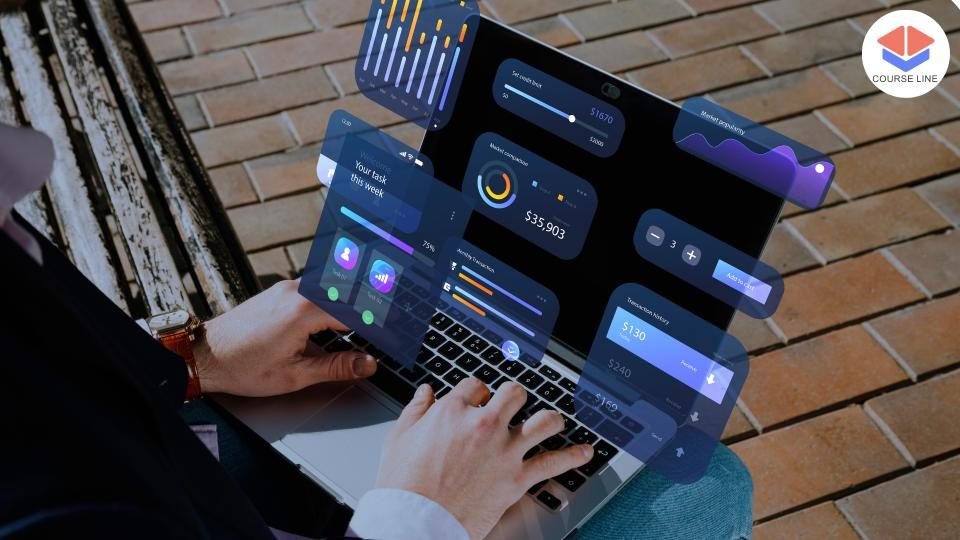Course Features
Price
Study Method
Online | Self-paced
Course Format
Reading Material - PDF, article
Duration
15 minutes
Qualification
No formal qualification
Certificate
At completion
Additional info
Coming soon
- Share
Overview
The T Level Digital Business Services: Analytics & Insight Essentials course is tailored to meet the growing demand for professionals who can turn data into actionable business value. It introduces learners to the digital business landscape, key roles within the sector, and the importance of data in strategic decision-making. Students begin by understanding the fundamentals of digital business services, the role of data in modern operations, and the technologies that support insight generation.
As the course progresses, students explore different types of data—quantitative and qualitative—and learn core principles of data collection, validation, and ethical use. They are trained to organise and manage datasets using spreadsheets and visualisation tools, learning to build dashboards and interpret charts and graphs to extract meaningful business intelligence. Tools like Excel, Power BI, and Tableau are introduced through real-world examples that demonstrate how data-driven decisions influence departments such as marketing, finance, and customer service.
Learners then move on to deeper analytical techniques including descriptive, diagnostic, predictive, and prescriptive analytics. They gain experience using KPIs and forecasting models to assess trends, track performance, and communicate findings effectively. The course also focuses on insight communication—how to present results to stakeholders through structured reports, storytelling, and professional presentation skills.
The final units equip learners with project management capabilities, using digital tools such as Trello, Asana, and Monday.com to simulate real team-based environments. They explore agile vs waterfall methodologies, collaboration best practices, and data governance essentials. In the final project, learners produce an insight report, build their portfolio, and prepare for digital business service roles through mock interviews and career workshops.
Who is this course for?
The T Level Digital Business Services: Analytics & Insight Essentials course is tailored to meet the growing demand for professionals who can turn data into actionable business value. It introduces learners to the digital business landscape, key roles within the sector, and the importance of data in strategic decision-making. Students begin by understanding the fundamentals of digital business services, the role of data in modern operations, and the technologies that support insight generation.
As the course progresses, students explore different types of data—quantitative and qualitative—and learn core principles of data collection, validation, and ethical use. They are trained to organise and manage datasets using spreadsheets and visualisation tools, learning to build dashboards and interpret charts and graphs to extract meaningful business intelligence. Tools like Excel, Power BI, and Tableau are introduced through real-world examples that demonstrate how data-driven decisions influence departments such as marketing, finance, and customer service.
Learners then move on to deeper analytical techniques including descriptive, diagnostic, predictive, and prescriptive analytics. They gain experience using KPIs and forecasting models to assess trends, track performance, and communicate findings effectively. The course also focuses on insight communication—how to present results to stakeholders through structured reports, storytelling, and professional presentation skills.
The final units equip learners with project management capabilities, using digital tools such as Trello, Asana, and Monday.com to simulate real team-based environments. They explore agile vs waterfall methodologies, collaboration best practices, and data governance essentials. In the final project, learners produce an insight report, build their portfolio, and prepare for digital business service roles through mock interviews and career workshops.
Requirements
The T Level Digital Business Services: Analytics & Insight Essentials course is tailored to meet the growing demand for professionals who can turn data into actionable business value. It introduces learners to the digital business landscape, key roles within the sector, and the importance of data in strategic decision-making. Students begin by understanding the fundamentals of digital business services, the role of data in modern operations, and the technologies that support insight generation.
As the course progresses, students explore different types of data—quantitative and qualitative—and learn core principles of data collection, validation, and ethical use. They are trained to organise and manage datasets using spreadsheets and visualisation tools, learning to build dashboards and interpret charts and graphs to extract meaningful business intelligence. Tools like Excel, Power BI, and Tableau are introduced through real-world examples that demonstrate how data-driven decisions influence departments such as marketing, finance, and customer service.
Learners then move on to deeper analytical techniques including descriptive, diagnostic, predictive, and prescriptive analytics. They gain experience using KPIs and forecasting models to assess trends, track performance, and communicate findings effectively. The course also focuses on insight communication—how to present results to stakeholders through structured reports, storytelling, and professional presentation skills.
The final units equip learners with project management capabilities, using digital tools such as Trello, Asana, and Monday.com to simulate real team-based environments. They explore agile vs waterfall methodologies, collaboration best practices, and data governance essentials. In the final project, learners produce an insight report, build their portfolio, and prepare for digital business service roles through mock interviews and career workshops.
Career path
The T Level Digital Business Services: Analytics & Insight Essentials course is tailored to meet the growing demand for professionals who can turn data into actionable business value. It introduces learners to the digital business landscape, key roles within the sector, and the importance of data in strategic decision-making. Students begin by understanding the fundamentals of digital business services, the role of data in modern operations, and the technologies that support insight generation.
As the course progresses, students explore different types of data—quantitative and qualitative—and learn core principles of data collection, validation, and ethical use. They are trained to organise and manage datasets using spreadsheets and visualisation tools, learning to build dashboards and interpret charts and graphs to extract meaningful business intelligence. Tools like Excel, Power BI, and Tableau are introduced through real-world examples that demonstrate how data-driven decisions influence departments such as marketing, finance, and customer service.
Learners then move on to deeper analytical techniques including descriptive, diagnostic, predictive, and prescriptive analytics. They gain experience using KPIs and forecasting models to assess trends, track performance, and communicate findings effectively. The course also focuses on insight communication—how to present results to stakeholders through structured reports, storytelling, and professional presentation skills.
The final units equip learners with project management capabilities, using digital tools such as Trello, Asana, and Monday.com to simulate real team-based environments. They explore agile vs waterfall methodologies, collaboration best practices, and data governance essentials. In the final project, learners produce an insight report, build their portfolio, and prepare for digital business service roles through mock interviews and career workshops.
-
-
- Premium Certificate 00:15:00

No Reviews found for this course.
Is this certificate recognized?
Yes, our premium certificate and transcript are widely recognized and accepted by embassies worldwide, particularly by the UK embassy. This adds credibility to your qualification and enhances its value for professional and academic purposes.
I am a beginner. Is this course suitable for me?
Yes, this course is designed for learners of all levels, including beginners. The content is structured to provide step-by-step guidance, ensuring that even those with no prior experience can follow along and gain valuable knowledge.
I am a professional. Is this course suitable for me?
Yes, professionals will also benefit from this course. It covers advanced concepts, practical applications, and industry insights that can help enhance existing skills and knowledge. Whether you are looking to refine your expertise or expand your qualifications, this course provides valuable learning.
Does this course have an expiry date?
No, you have lifetime access to the course. Once enrolled, you can revisit the materials at any time as long as the course remains available. Additionally, we regularly update our content to ensure it stays relevant and up to date.
How do I claim my free certificate?
I trust you’re in good health. Your free certificate can be located in the Achievement section. The option to purchase a CPD certificate is available but entirely optional, and you may choose to skip it. Please be aware that it’s crucial to click the “Complete” button to ensure the certificate is generated, as this process is entirely automated.
Does this course have assessments and assignments?
Yes, the course includes both assessments and assignments. Your final marks will be determined by a combination of 20% from assignments and 80% from assessments. These evaluations are designed to test your understanding and ensure you have grasped the key concepts effectively.
Is this course accredited?
We are a recognized course provider with CPD, UKRLP, and AOHT membership. The logos of these accreditation bodies will be featured on your premium certificate and transcript, ensuring credibility and professional recognition.
Will I receive a certificate upon completion?
Yes, you will receive a free digital certificate automatically once you complete the course. If you would like a premium CPD-accredited certificate, either in digital or physical format, you can upgrade for a small fee.
Course Features
Price
Study Method
Online | Self-paced
Course Format
Reading Material - PDF, article
Duration
15 minutes
Qualification
No formal qualification
Certificate
At completion
Additional info
Coming soon
- Share
Gamekeeping Level 8 Advanced Diploma
Course Line240£490.00Original price was: £490.00.£14.99Current price is: £14.99.Time Management Level 3 Advanced Diploma
Course Line244£490.00Original price was: £490.00.£14.99Current price is: £14.99.
Related Courses
T Level Science: Laboratory Techniques & Data Handling
£490.00Original price was: £490.00.£14.99Current price is: £14.99. 237
237T Level Construction: Design, Surveying & the Built Environment
£490.00Original price was: £490.00.£14.99Current price is: £14.99. 237
237T Level Accounting: Principles of Finance & Record-Keeping
£490.00Original price was: £490.00.£14.99Current price is: £14.99. 237
237
Related Courses
T Level Science: Laboratory Techniques & Data Handling
£490.00Original price was: £490.00.£14.99Current price is: £14.99. 237
237T Level Construction: Design, Surveying & the Built Environment
£490.00Original price was: £490.00.£14.99Current price is: £14.99. 237
237T Level Accounting: Principles of Finance & Record-Keeping
£490.00Original price was: £490.00.£14.99Current price is: £14.99. 237
237








